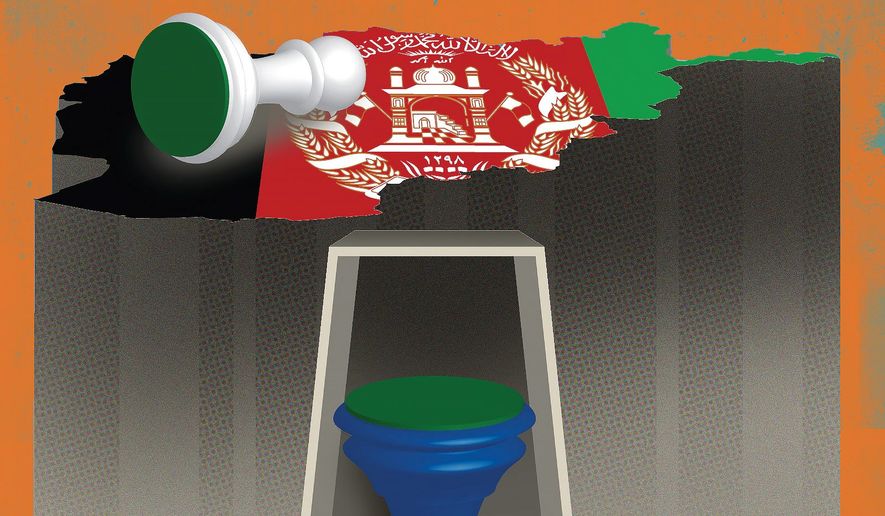OPINION:
Under President Joe Biden’s order, all US troops in Afghanistan will be withdrawn by month’s end except for the hundred or so guarding our embassy in Kabul. Coalition troops are withdrawing on the same schedule. The Taliban’s reconquest of Afghanistan is proceeding rapidly against the sometimes resistance of Afghan security forces.
The fact is that we have been defeated there in almost exactly the same way we were in Vietnam. Politicians and pundits are already trying to blame our defeat on some disfavored person or group.
History will soon find that there is plenty of blame to go around for our defeat in the twenty-year Afghanistan War. Presidents, vice presidents, cabinet members, and White House advisors, as well as the generals who ran the war, all must share it.
Winning is an accumulation of decisions, and so is defeat. It’s not difficult to identify the people and organizations who made the bad decisions that compounded over twenty years to comprise the reasons for our defeat. Before we do that, it’s necessary to define what comprised our defeat. Then we can identify those responsible for making and carrying out the decisions that led to it.
President George W. Bush established the original mission to overthrow the Taliban government, punish al-Qaida, bring Usama bin Laden to justice, and then deliver peace and democracy to Afghanistan.
We overthrew the Taliban government quickly, but they were never truly defeated and have never severed their ties to al-Qaida. It took ten years to kill bin Laden, but peace never came to Afghanistan. Our attempt to implant democracy failed as it inevitably would.
Mr. Bush’s nation-building strategy, as I have written since 2003, was fundamentally flawed. Islam prohibits the separation of religion and state and therefore doesn’t permit democracy. It was easy for the Taliban to convince the Afghan people that we were the enemy, trying to steal their religion. By failing to defeat the Islamist ideology, we could not win in Afghanistan or Iraq.
Mr. Bush’s strategy and his successors’ actions failed to prevent China, Russia, Pakistan, and Iran from supporting the Taliban, which they have, for years, with funds and arms.
The Afghanistan War, named “Operation Enduring Freedom,” began on October 7, 2001, when the first Army Special Forces unit entered Afghanistan. In November 2001, then-secretary of defense Donald Rumsfeld – as he wrote in his memoir - told Mr. Bush, “It’s my view we need to limit our mission to getting the terrorists who find their way to Afghanistan. We ought not to make a career out of transforming Afghanistan.” Mr. Bush decided against that advice.
Mr. Bush’s nation-building strategy is the principal reason we lost in both Afghanistan and Iraq. In his memoir, then-vice president Richard Cheney makes no mention of advising against nation-building, so he must share the blame. So must then-secretary of state Colin Powell whose “Pottery Barn” rule – “if you break it, you bought it” – convinced Mr. Bush to undertake nation-building.
Presidents Obama and Trump both must also share the blame, as must President Biden who, as Mr. Obama’s vice president, stood with him on strategy. Mr. Obama intentionally surrendered the ideological war and supported the nation-building strategy as an afterthought. Mr. Trump never saw the necessity for the ideological war and continued nation-building for lack of a better idea. His 2020 “peace deal” with the Taliban assumed, rather than required that the Taliban would enter into serious peace negotiations and sever its ties to al-Qaida. It never did either.
A great share of the blame must go to the generals and admirals who convinced themselves that nation-building and the counterinsurgency strategy – “COIN,” which meshed with it perfectly — was succeeding in Afghanistan and then Iraq. Generals such as David Petraeus, who authored the COIN strategy, and others whose names became household words — George Casey, Stanley McChrystal, and more – either didn’t understand why nation-building couldn’t succeed or simply drank the COIN Kool-Aid. Even after it became clear that nation-building was failing, they continued to support it.
The generals who commanded in Afghanistan, in particular, deluded themselves into believing that twenty years of US training guaranteed that Afghan soldiers would fight rather than desert the Kabul government after US and Coalition troops left. That delusion enabled the Taliban’s ongoing reconquest of Afghanistan.
President Biden sent B-52s and AC-130 gunships to target some Taliban on August 7 to cover our retreat. There’s no evidence that the airstrikes even slowed the Taliban’s advance. Mr. Biden should have left sufficient airpower, special forces, and intelligence assets in Afghanistan to prevent the creation of terrorist safe havens from which attacks could be mounted against us or our allies. Had he done so, the Taliban’s reconquest of Afghanistan would have been rendered almost insignificant.
The Taliban will soon capture Kabul and re-establish their “emirate” in Afghanistan. Whatever rights Afghan men and women had under the US-supported Kabul government will evaporate overnight.
Many lessons should be learned from our defeat in Afghanistan, but that is for another day. We first have to ask ourselves whether America is, at this point in history, politically capable of winning any war.
• Jed Babbin, a deputy undersecretary of Defense in the George H.W. Bush administration, is the author of “In the Words of Our Enemies.”




Please read our comment policy before commenting.